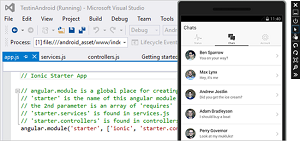News
Visual Studio 2015 Arrives with Embrace of Android
- By David Ramel
- July 21, 2015
Microsoft yesterday made the huge new release of Visual Studio 2015 available for download, with an embrace of cross-platform mobile development for Android -- and even iOS -- apps.
While the flagship development environment has been branching out into cross-platform development for years now, the new edition caters even more to what used to be the enemy camp, in light of the poor market performance of Windows Phone. Even iOS development is supported, though Android is even more of a first-class citizen. Enhanced Android support puts Google's OS on almost equal billing with .NET and Windows Universal Apps development (though you have to wait until July 29 for official release of Windows 10 for the latter).
"Visual Studio 2015 even includes a high-performance Visual Studio Emulator for Android for debugging and testing Android applications," Microsoft exec Somasegar said in a blog post yesterday. (As if to emphasize the importance of that statement, Somasegar wrote that same exact sentence twice -- though it could just be an oversight by Microsoft's PR minions.)
 [Click on image for larger view.]
The New Emulator for Android (source: Microsoft)
[Click on image for larger view.]
The New Emulator for Android (source: Microsoft)
With Visual Studio 2015, developers have several options for cross-platform development. It supports cross-platform Web apps built with HTML, CSS and JavaScript that run in the browser, hybrid apps that can be installed from stores with native functionality (unlike browser-based apps) and straight native development.
In the hybrid approach, development is done with Visual Studio Tools for Apache Cordova, a framework using a plug-in model that can open up native functionality via JavaScript APIs that communicate with iOS, Android and Windows devices. Cordova functionality was provided in Visual Studio 2013 in a preview version. With Cordova, native SDKs, tools and libraries are used to target the different OSes. Microsoft said this approach provides "nearly 100 percent shared code" across platforms.
Such shared code bases can also be created solely in Microsoft's C# programming language, via Xamarin tooling. Xamarin can be used to write custom, native UIs for iOS, Android, Windows and Mac apps, or to build one shared UI across all platforms with Xamarin.Forms.
"By combining Visual Studio 2015 and Xamarin, developers can extend their .NET applications to also target iOS and Android," Somasegar said. "With Xamarin, everything you can do in Java or Objective-C is available from .NET and Visual Studio."
Microsoft said that with Xamarin, "Apps are compiled to native code and leverage platform-specific hardware acceleration for optimal performance on each device."
For hard-core coders requiring the best performance, C++ is another option in Visual Studio 2015 for cross-platform, native development.
The IDE lets developers "share, reuse, build, deploy and debug your cross-platform C++ mobile code," Microsoft says on its Web site. "Create projects from templates for Android Native-Activity applications, or create high-performance shared libraries to include in other solutions. You can also bring your existing C++ code to mobile platforms with minimal work. Use platform specific IntelliSense, validate code without building as you type, set breakpoints, watch variables and deploy the application to devices (ARM, x86) and emulators alike."
For gaming, Visual Studio 2015 leverages the Unity engine for cross-platform development. This game development can be done all for free, using Unity for Windows, the Visual Studio 2015 Community Edition and Visual Studio 2015 Tools for Unity
The cross-platform development functionality is supported by Microsoft's Mobile-Back-End-as-a-Service (MBaaS) offering, Azure Mobile Services, along with Application Insights for app monitoring and analytics, and connected services for data integration.
See this article by sister site Visual Studio Magazine for more on the official release of Visual Studio 2015 and the Microsoft .NET Framework 4.6.
About the Author
David Ramel is an editor and writer at Converge 360.